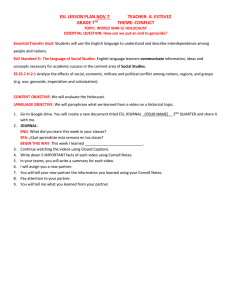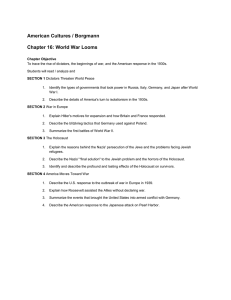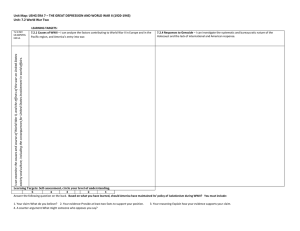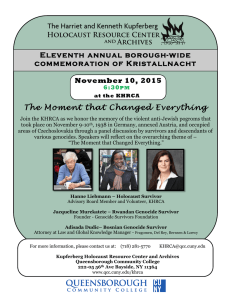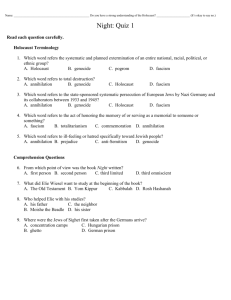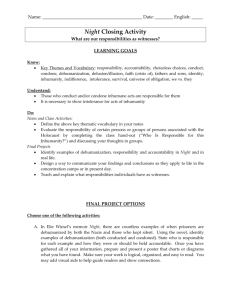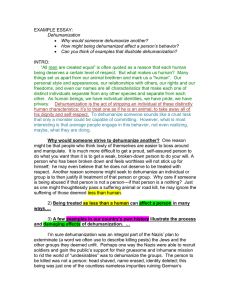Worlds Apart but not Strangers: Holocaust Education and Indian Education... 9-10 Introductions
advertisement
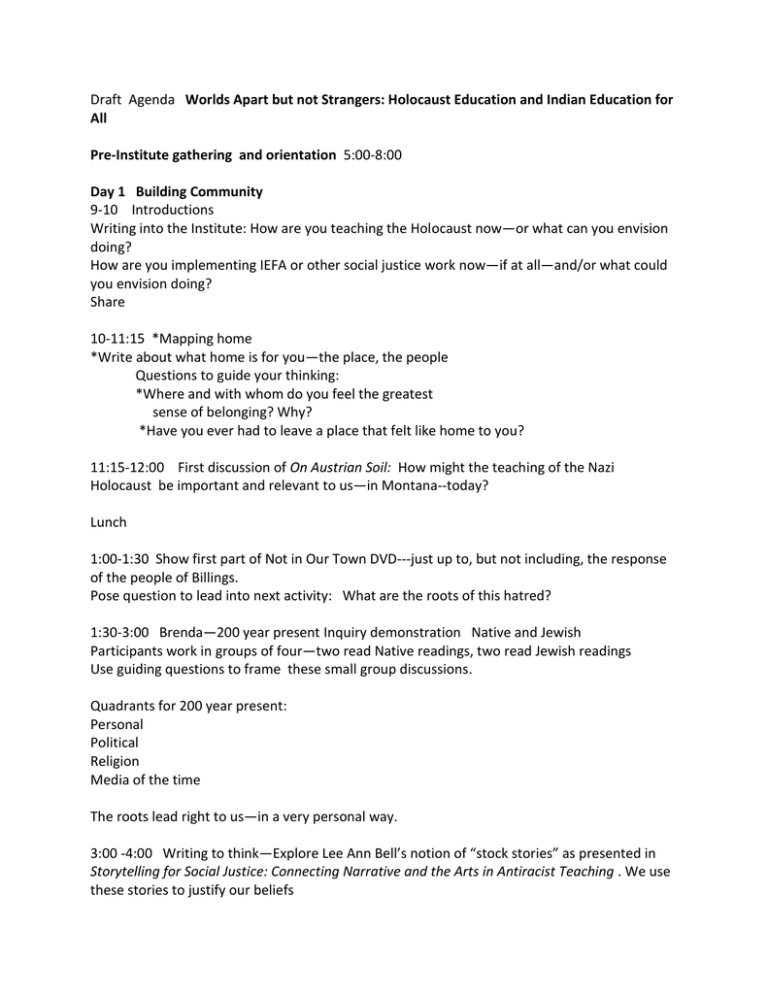
Draft Agenda Worlds Apart but not Strangers: Holocaust Education and Indian Education for All Pre-Institute gathering and orientation 5:00-8:00 Day 1 Building Community 9-10 Introductions Writing into the Institute: How are you teaching the Holocaust now—or what can you envision doing? How are you implementing IEFA or other social justice work now—if at all—and/or what could you envision doing? Share 10-11:15 *Mapping home *Write about what home is for you—the place, the people Questions to guide your thinking: *Where and with whom do you feel the greatest sense of belonging? Why? *Have you ever had to leave a place that felt like home to you? 11:15-12:00 First discussion of On Austrian Soil: How might the teaching of the Nazi Holocaust be important and relevant to us—in Montana--today? Lunch 1:00-1:30 Show first part of Not in Our Town DVD---just up to, but not including, the response of the people of Billings. Pose question to lead into next activity: What are the roots of this hatred? 1:30-3:00 Brenda—200 year present Inquiry demonstration Native and Jewish Participants work in groups of four—two read Native readings, two read Jewish readings Use guiding questions to frame these small group discussions. Quadrants for 200 year present: Personal Political Religion Media of the time The roots lead right to us—in a very personal way. 3:00 -4:00 Writing to think—Explore Lee Ann Bell’s notion of “stock stories” as presented in Storytelling for Social Justice: Connecting Narrative and the Arts in Antiracist Teaching . We use these stories to justify our beliefs For example, America is a meritocracy, perceptions of the “American dream” perspective-taking What is a stock story your family has passed down to you? Write and share 5:00-8:00 Evening activity—Writing marathon in the Bitterroot forced leaving the Bitterroot/Salish dislocation Heather Cahoon, Salish poet Day 2—Signs on the Road to Hate 9-9:45 Writing into the Day— Pass out copies of the Pyramid of Hate. Identify examples of behavior you have witnessed in your school that might fit into one or two of the levels of the Pyramid. 9:45-11:00 (Wendy) Stereotypes—Stereotype Busters and writing stereotype poems Working definitions of stereotypes, prejudice and discrimination 11:30 Read The Terrible Things (an allegory for the Holocaust), by Eve Bunting—and identify and discuss the roles of Target, Perpetrator, Ally, Bystander 11:30-12 Writing and discussion of a section of On Austrian Soil. .. the section about the tour of Innsbruck and things that are hidden right before our eyes. Write a reaction to that section. Share. Lunch 1:00-2:00 Signs on Road to Auschwitz: Human Timeline of events leading up to the Nazi Holocaust Show video clips of survivor testimony—about the dehumanization that led up to the Holocaust (sections from Gisa’s and/or Irving’s tetimony; clips from Echoes and Reflections) 2:15-3:15 Gallery Walk: Federal Policies regarding American Indians—dehumanization that led to genocide Video clips of testimony of dehumanization (boarding schools, etc.) MontanaTribes Digital Archives, Our Spirits Don’t Speak English, clips from We Shall Remain and When It’s All Over, I’ll Still be Indian 3:15-4:00 Ending the day with hope: Resilience What are ways people are resilient? How do people cope with dehumanization? Resiliency studies information Irving video clip Focus on the arts: Wendy’s poem “Echoes” Klezmer Music video or DVD or Metropolitan Klezmer playing 6:00-9:00 Evening—dinner and presentation: Jack Gladstone Day 3—Nazi Genocide 9-10-10:30 Writing into the Day—write a Bearing Witness poem Upcoming Invitation: At the end of the day on Friday, we’ll ask you to write an action plan including at least first steps you might take to bring this experience to your school or community in some way… 10:30 -12:00 Jewish Rabbi or community member and/or Hillel student Topic: Jewish life before the Holocaust/Contemporary Jewish life in Montana Lunch 1:00-3:00 Survivor testimony 3:00-4:00 On Austrian Soil: Revisit the section of the book that asks the question: What is our response-ability? Draw a response—What is our response-ability to each other as human beings when we witness dehumanization? What does dehumanization look like? How can we reverse it? 6:00-8:00 Community dinner and discussion Day 4—Looking Toward Home 9:00-9:45 Writing into the Day—Write about a time you have experienced or witnessed someone in the role of target, perpetrator, ally, bystander. Bring us into that scene (explode a moment: and talk about L. Christensen’s chapter on that topic) 10:00-12:00 Defining Genocide using Primary Source Documents: Wannsee Conference—pp. 100-104 The World Must Know decision to implement a “final solution” Examine and discuss U.N. Definition of Genocide Bear River Massacre primary documents—Does what you find here fit the definition of genocide? Take notes on a part of the document that seems to fit---and what part of the definition does it seem to fit? Lunch 1:00-4:00 Darryl Kipp Bear River Massacre/federal policy/immersion school/ contemporary issues Act out our physical response—activity that was introduced by Bjorn Krondorfer 6-8 Evening—Native Drum group or activity at U of MNative American Center or Darryl Kipp— Heather Cahoon Salish and Blackfeet presence in and around what is now Missoula Day 5—Facing Our Response-ability…Bringing it All Home 9:00-9:45 Discuss: Groups targeted/dehumanized in U.S. historically through government policy or cultural privilege: (ex. slavery, Japanese internment , Chinese laborers , non British immigrants, over 500 tribes of Native Americans) Write: What groups and/or individuals are dehumanized in your school and your town—from your perspective? ….from your students’ perspective? Share (share my student’s list?) Revisit roles…R,P,A,B We make choices, every minute of every day, which role we are going to play. Invitation Reminder: Today at the end of the day, we’ll ask you to write an action plan or a first step you might take to bring this information to your school or community 10—12:00 Darryl Kistler and Rabbi from Kalispell Issues in the Flathead Valley—Neo Nazi groups/Holocaust denial/Responding proactively “Love Lives Here” Lunch 1-1:30 On Austrian Soil –what parallels do you see between Sondra’s experiences in Austria and contemporary teaching issues in this country? Are there topics we are avoiding in our classrooms/schools/communities? 1:30-2:00 Watch the rest of Not in Our Town—clips from Not in Our Schools… 2:00-4:00 Work in small groups or individually to create a beginning action plan –or maybe a first step that you could bring to your school or community. Share 6:00-8:00 Attend Shabbat service, if possible, or visit to synagogue to view the Torah, etc. (alternate evening synagogue visit on Wednesday night)
